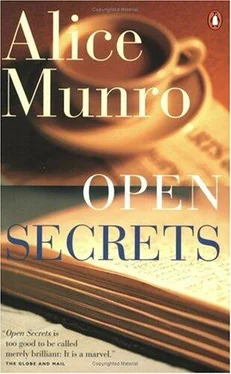“That’s sweet of you,” he said, and asked her to go to a dance that night, the opening dance of the season in the Walley Pavilion.
After that, they went to the dance in Walley every Saturday night. They didn’t go out together during the week, because Billy had to get up early and go to the factory and learn the business — from his mother, known as the Tatar — and Rhea had to do some housekeeping for her father and brothers. Her mother was in the hospital, in Hamilton.
“There goes your heartthrob,” girls would say if Billy drove by the school when they were out playing volleyball, or if he passed on the street, and in truth Rhea’s heart did throb — at the sight of him, his bright hatless hair, his negligent but surely powerful hands on the wheel. But also at the thought of herself suddenly singled out, so unexpectedly chosen, with the glow of a prizewinner — or a prize — about her now, a grace formerly hidden. Older women she didn’t even know would smile at her on the street, girls wearing engagement rings spoke to her by name, and in the mornings she would wake up with the sense that she had been given a great present, but that her mind had boxed it away overnight, and she could not for a moment remember what it was.
Billy brought her honor everywhere but at home. That was not unexpected — home, as Rhea knew it, was where they cut you down to size. Her younger brothers would imitate Billy offering their father a cigarette. “Have a Pall Mall, Mr. Sellers.” They would flourish in front of him an imaginary package of ready-mades. The unctuous voice, the complacent gesture made Billy Doud seem asinine. “Putty” was what they called him. First “Silly Billy,” then “Silly Putty,” then “Putty” by itself.
“You quit tormenting your sister,” Rhea’s father said. Then he took it up himself, with a businesslike question. “You aim to keep on at the shoe store?”
Rhea said, “Why?”
“Oh. I was just thinking. You might need it.”
“What for?”
“To support that fellow. Once his old lady’s dead and he runs the business into the ground.”
And all the time Billy Doud said how much he admired Rhea’s father. Men like your father, he said. Who work so hard. Just to get along. And never expect any different. And are so decent, and even-tempered, and kindhearted. The world owes a lot to men like that.
Billy Doud and Rhea and Wayne and Lucille would leave the dance around midnight and drive in the two cars to the parking spot, at the end of a dirt road on the bluffs above Lake Huron. Billy kept the radio on, low. He always had the radio on, even though he might be telling Rhea some complicated story. His stories had to do with his life at college, with parties and practical jokes and dire escapades sometimes involving the police. They always had to do with drinking. Once, somebody who was drunk vomited out a car window, and so noxious was the drink he had taken that the paint was destroyed all down the side of the car. The characters in these stories were not known to Rhea, except for Wayne. Girls’ names cropped up occasionally, and then she might have to interrupt. She had seen Billy Doud home from college, over the years, with girls whose looks, or clothes, whose jaunty or fragile airs, she had been greatly taken with, and now she had to ask him, Was Claire the one with the little hat that had a veil, and the purple gloves? In church? Which one had the long red hair and the camel’s-hair coat? Who wore velvet boots with mouton tops?
Usually, Billy was not able to remember, and if he did go on to tell her more about these girls, what he had to say might not be complimentary.
When they parked, and sometimes even while they drove, Billy put an arm around Rhea’s shoulders, he squeezed her. A promise. There were promises also during their dances. He was not too proud to nuzzle her cheek then, or drop a row of kisses on her hair. The kisses he gave her in the car were quicker, and the speed, the rhythm of them, the little smacks they might be served up with informed her that they were jokes, or partly jokes. He tapped his fingers on her, on her knees, and just at the top of her breasts, murmuring appreciatively and then scolding himself, or scolding Rhea, saying that he had to keep the lid on her.
“You’re quite the baddy,” he said. He pressed his lips tightly against hers as if it was his job to keep both their mouths shut.
“How you entice me,” he said, in a voice not his own, the voice of some sleek and languishing movie actor, and slipped his hand between her legs, touched the skin above her stocking — then jumped, laughed, as if she was too hot there, or too cold.
“Wonder how old Wayne is getting on?” he said.
The rule was that after a time either he or Wayne would sound a blast on the car horn, and then the other one had to answer. This game — Rhea did not understand that it was a contest, or at any rate what kind of a contest it was — came eventually to take up more and more of his attention. “What do you think?” he would say, peering into the night at the dark shape of Wayne’s car. “What do you think — should I give the boy the horn?”
On the drive back to Carstairs, to the bootlegger’s, Rhea would feel like crying, for no reason, and her arms, her legs, would feel as if cement had been poured into them. Left alone, she would probably have fallen fast asleep, but she couldn’t stay alone because Lucille was afraid of the dark, and when Billy and Wayne went into Monk’s Rhea had to keep Lucille company.
Lucille was a thin, fair-haired girl, with a finicky stomach, irregular periods, and a sensitive skin. The vagaries of her body fascinated her and she treated it as if it was a troublesome but valuable pet. She always carried baby oil in her purse and patted it on her face, which would have been savaged, a little while ago, by Wayne’s bristles. The car smelled of baby oil and there was another smell under that, like bread dough.
“I’m going to make him shave once we get married,” Lucille said. “Right before.”
Billy Doud had told Rhea that Wayne had told him he had stuck to Lucille all this time, and was going to marry her, because she would make a good wife. He said that she wasn’t the prettiest girl in the world and she certainly wasn’t the smartest and for that reason he would always feel secure in the marriage. She wouldn’t have a lot of bargaining power, he said. And she wasn’t used to having a lot of money.
“Some people might say that was taking a cynical approach,” Billy had said. “But others might say realistic. A minister’s son does have to be realistic, he’s got to make his own way in life. Anyway, Wayne is Wayne.
“Wayne is Wayne,” he had repeated with solemn pleasure.
One time Lucille said to Rhea. “So how about you? Are you getting used to it?”
“Oh, yes,” Rhea said.
“They say it’s better without gloves on. I guess I’ll find out once I’m married.”
Rhea was too embarrassed to admit not having understood at once what they were talking about.
Lucille said that once she was married she would be using sponges and jelly. Rhea thought that sounded like a dessert, but she did not laugh, because she knew Lucille would take such a joke as an insult. Lucille began to talk about the conflict that was raging round her wedding, about whether the bridesmaids should wear picture hats or wreaths of rosebuds. Lucille had wanted rosebuds, and she thought it was all arranged, and then Wayne’s sister had got a permanent that turned out badly. Now she wanted a hat to cover it up.
“She isn’t a friend, even — she’s only in the wedding because of being his sister and I couldn’t leave her out. She’s a selfish person.”
Wayne’s sister’s selfishness had made Lucille break out in hives.
Читать дальше












